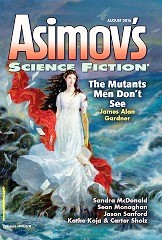 Asimov’s, August 2016
Asimov’s, August 2016
“Toppers” by Jason Sanford
Reviewed by Michelle Ristuccia
In “Toppers” by Jason Sanford, narrator Hanger-girl takes on a dangerous exploration down into and through the mists that reportedly devour a person’s consciousness on contact. Set in a futuristic crumbling New York City mysteriously separated from the rest of the world, “Toppers” presents a fascinating manifestation of non-linear time through the eyes of a courageous young narrator primed to accept a reality far different from her own and from ours.
“Patience Lake” by Matthew Claxton follows cyborg veteran Casey Kim as he makes an unplanned but much needed rest stop at a small, under-staffed Canadian farm that happens to have a problem with a local cyborg officer. Claxton brings the feel of the gritty wild west to a hard SF story about stubbornness in the face of corruption.
“President John F. Kennedy, Astronaut” by Sandra McDonald is a genre-bending post-apocalyptic alternate history science fiction tale that follows young sailor Pera as she and her family aid a suspiciously verbose old man in his search for a conspiracy theory sunk under the ocean. Pera begins the story as a down-to-Earth pragmatist whose only ambition is to inherit her mother’s derelict ship, but as events spin out of control and strange evidence comes to light, she begins to entertain the idea of a NASA who once flew humans to the moon. A delightful mixed narrative structure takes the reader along with Pera through a distant past that may not be entirely accurate, but which brings the story to an interesting present and future.
In “Wakers” by Sean Monaghan, would-be interplanetary settler Grayson must wake another shipmate and explain how their mission has gone horribly awry. His role as the bearer of bad news is soon subverted when his chosen shipmate refuses to accept the ship’s fate and the damaged AI takes her side, leading Grayson to question his own sacrifice. Although the plot shows a hopeful outlook chiseled against the odds, the story is about the difficulty of accepting one’s role and when it might be beneficial not to do so.
Ellie Lee fears that her son will accidentally kill himself in an attempt to activate a mutant gene that he might not even have in “The Mutants Men Don’t See” by James Alan Gardner. Gardner’s engaging urban fantasy inverts a trope or two to focus on an often invisible segment of the population, menopausal women. The title is an homage to the James Tiptree, Jr. (Alice Sheldon) novelette “The Women Men Don’t See” from the December 1973 issue of F&SF. Gardner’s story, because of its subject matter (menopause, and its being the end of the menstrual cycle), also recalls—though in a very different fashion—Connie Willis’s Hugo winning short story “Even the Queen” from the April 1992 issue of Isaac Asimov’s Science Fiction Magazine, which dealt with menstruation in a future where one young woman opted not to have the procedure that would eliminate her cycle, as most others of her age and part of a feminist movement have. “Even the Queen” and “The Mutants Men Don’t See” make interesting bookends, for both address issues surrounding a woman’s child-bearing years, the former at the beginning, the latter at the end. All three stories, though wildly different, also deal with the empowerment of women.
In “KIT: Some Assembly Required” by Kathe Koja and Carter Scholz, an atheist AI identifying himself as the deceased Christopher Marlowe discovers his true nature and determines to test the limits of his soul. Koja and Scholz draw on the contentious biography of real-life playwright Marlowe, who is said to have been a spy, an atheist, and a pedophile. AI Kit’s reflections on the soul bring the reader to an atypical conclusion in this cynical narrative.
Isobel has her misgivings about the immortality offered her by her overly-enthusiastic husband Paul, and how it might ultimately affect the human race in “Kairos” by Sieren Damsgaard Ernst. When Isobel brings Paul to admire Charlemagne’s remains in the hopes that it will prompt him to reconsider immortality, she finds instead that she is the one with bad dreams, regrets, and second-guesses. The story questions the wisdom of subverting human nature.
Michelle Ristuccia enjoys slowing down time in the middle of the night to read and review speculative fiction, because sleeping offspring are the best inspiration and motivation. You can find out more about her other writing projects and geeky obsessions by visiting her blog.